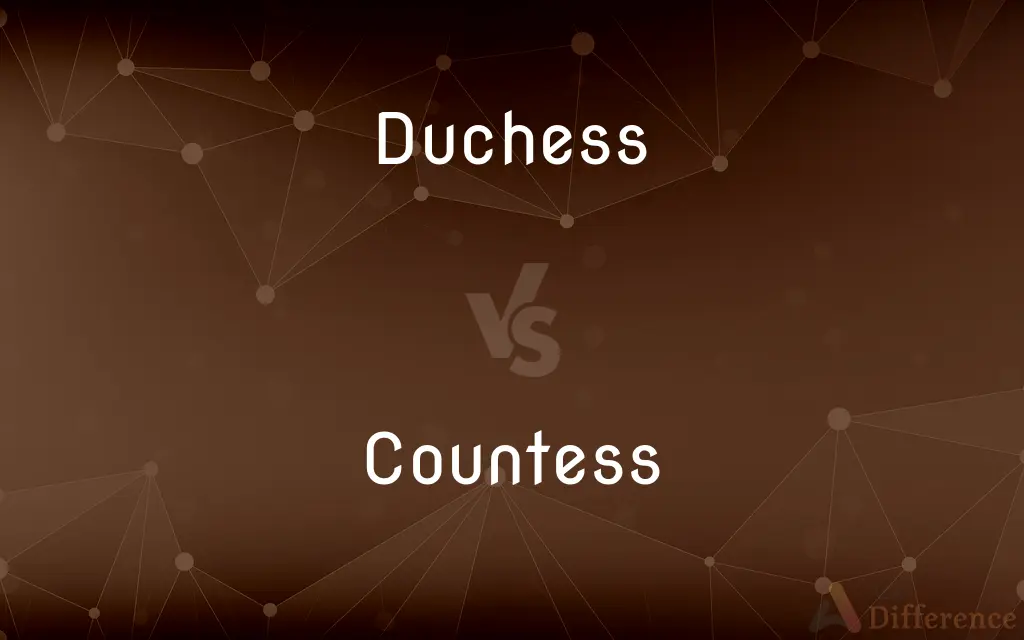Duchess vs. Countess — What's the Difference?
By Urooj Arif & Fiza Rafique — Updated on March 12, 2024
A Duchess is the wife or widow of a Duke or a woman holding ducal rank in her own right, while a Countess is the wife or widow of an Earl or Count, or a woman holding countly rank in her own right.

Difference Between Duchess and Countess
Table of Contents
ADVERTISEMENT
Key Differences
In terms of noble hierarchy, a Duchess ranks above a Countess. The title of Duchess is associated with the highest ranks of the nobility, just below the monarch and princes of the royal family in many European countries. A Countess, on the other hand, holds a rank that is generally considered one step below a Duchess and is associated with the governance or ownership of a county or earldom.
The responsibilities and privileges associated with these titles have historically varied by region and era. Duchesses, given their higher rank, often had significant influence and responsibilities, including managing vast estates and playing key roles in social and political affairs. Countesses, while also influential, typically had duties and privileges on a slightly smaller scale, often centered around their county or earldom.
The titles can be hereditary, passed down through familial lines, or granted by the monarch as a reward for service or loyalty. A woman can become a Duchess or Countess by marriage to a Duke or Earl/Count, respectively, or by inheriting the title if the laws of succession allow it, which varies significantly from one jurisdiction to another.
In literature and media, Duchesses and Countesses are often depicted with a certain level of prestige and influence, reflecting their historical status. These portrayals can range from benevolent patrons and leaders to scheming members of the court, depending on the narrative.
Despite the historical and social significance of these titles, in contemporary society, the roles of Duchesses and Countesses are more ceremonial than practical, with their influence largely relegated to social, charitable, and cultural activities rather than governance.
ADVERTISEMENT
Comparison Chart
Rank
Above Countess, below royal family
Below Duchess, above Viscountess
Association
Dukedoms
Counties or Earldoms
Responsibilities
Managing estates, social and political influence
Often similar but on a smaller scale, centered around a county
Acquisition
Marriage, inheritance, or monarch's grant
Marriage, inheritance, or monarch's grant
Depiction in Media
Varied, from influential to scheming
Often depicted with prestige, but less prominently than Duchesses
Compare with Definitions
Duchess
A woman married to a Duke or holding a ducal title in her own right.
The Duchess of Cambridge is known for her charitable work.
Countess
Holds a noble rank, typically associated with governance of a county.
Historically, Countesses might have been involved in the administration of their counties.
Duchess
Often involved in significant social, political, or charitable activities.
Historical Duchesses played key roles in court politics and social affairs.
Countess
Duties historically included estate management and local governance.
Countesses often managed their estates and participated in local charitable activities.
Duchess
Holds a high rank in the nobility, directly below the royal family.
Duchesses often had significant estates to manage historically.
Countess
Title can be hereditary or granted as a recognition.
The title of Countess can pass through hereditary lines or be conferred by royal decree.
Duchess
Can inherit or be granted the title by the monarch.
Some Duchesses have inherited their titles through primogeniture or special remainder.
Countess
In media, depicted with dignity and influence, though less prominently than Duchesses.
Countesses in literature are often portrayed with grace and authority, though they might not be the primary focus.
Duchess
Represented in media and literature as figures of prestige and power.
In many novels, Duchesses are depicted as central figures in social circles.
Countess
A woman holding the title of count or earl.
Duchess
The wife or widow of a duke.
Countess
The wife or widow of a count in various European countries.
Duchess
A woman holding title to a duchy in her own right.
Countess
The wife or widow of an earl in Great Britain.
Duchess
Used as the title for such a noblewoman.
Countess
Used as a title for such a noblewoman.
Duchess
The wife or widow of a duke.
Countess
The wife of a count or earl.
Duchess
The female ruler of a duchy.
Countess
A woman holding the rank of count or earl in her own right; a female holder of an earldom.
Elizabeth Millicent Leveson-Gower is 24th Countess of Sutherland; her son will be the 25th Earl.
Duchess
To court or curry favour for political or business advantage; to flatter obsequiously.
Countess
The wife of an earl in the British peerage, or of a count in the Continental nobility; also, a lady possessed of the same dignity in her own right. See the Note under Count.
Duchess
The wife or widow of a duke; also, a lady who has the sovereignty of a duchy in her own right.
Countess
Female equivalent of a count or earl
Duchess
The wife of a duke or a woman holding ducal title in her own right
Common Curiosities
Can a woman be a Duchess or Countess in her own right?
Yes, women can hold these titles in their own right, either through inheritance or royal grant, depending on the laws of succession and the specific circumstances.
What is the difference in responsibilities between a Duchess and a Countess?
Historically, both had responsibilities related to estate management and social duties, but Duchesses, due to their higher rank, often had wider influence and larger estates.
Are there any countries where the titles of Duchess and Countess are still significant?
While the titles hold ceremonial and social significance, their practical political power is limited in contemporary times, most notably in the United Kingdom and certain European countries.
How are Duchesses and Countesses addressed?
They are typically addressed as "Your Grace" for Duchesses and "Lady" for Countesses, although this can vary by country and specific tradition.
How does one become a Duchess or Countess?
One can become a Duchess or Countess through marriage to a Duke or Earl/Count, respectively, by inheriting the title, or by being granted the title by a monarch.
What role do Duchesses and Countesses play in modern society?
Today, their roles are largely ceremonial, involving charitable work, public appearances, and participation in cultural events, with little direct political power.
Can the title of Duchess or Countess be passed to children?
Titles can be passed to children based on the laws of succession, which vary. Sons typically inherit titles, but in some cases, daughters may inherit, especially if there are no male heirs.
Is the rank of Duchess or Countess recognized globally?
While recognized, the significance of these titles varies globally, with some countries placing more cultural emphasis on them than others.
How did the roles of Duchesses and Countesses evolve over time?
Their roles have shifted from governance and political influence to more ceremonial and charitable functions, reflecting broader societal changes and the diminishing political power of the nobility.
Can a Duchess or Countess lose her title?
Titles can be revoked by the monarch in extreme cases or lost through marriage, especially if marrying someone of lower or no title without royal permission, depending on the country's laws and customs.
Share Your Discovery

Previous Comparison
Amnesty vs. Pardon
Next Comparison
Pantaloons vs. TrousersAuthor Spotlight
Written by
Urooj ArifUrooj is a skilled content writer at Ask Difference, known for her exceptional ability to simplify complex topics into engaging and informative content. With a passion for research and a flair for clear, concise writing, she consistently delivers articles that resonate with our diverse audience.
Co-written by
Fiza RafiqueFiza Rafique is a skilled content writer at AskDifference.com, where she meticulously refines and enhances written pieces. Drawing from her vast editorial expertise, Fiza ensures clarity, accuracy, and precision in every article. Passionate about language, she continually seeks to elevate the quality of content for readers worldwide.














































